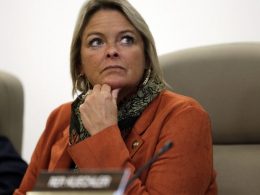Salem, OR – Lori Chavez-DeRemer, the one-term Oregon congresswoman nominated by former President Donald Trump to lead the U.S. Department of Labor, faced intense questioning during a Senate Health, Education, Labor and Pensions Committee hearing this week. The scrutiny centered on her past support for pro-union legislation, particularly her endorsement of the PRO Act, a measure championed by labor unions to strengthen their collective bargaining power.
Chavez-DeRemer, who lost her 2024 reelection bid to Democratic Representative Janelle Bynum, was called to defend her record before a divided Senate. Her nomination has surprised many observers, especially given her past promotion as a bipartisan, pro-labor advocate during her time in Congress. She attempted to assure Republican senators, who had expressed concerns about her pro-union stances, that she no longer fully supported the PRO Act and instead backed state-level laws that limit union power.
“I signed on to the PRO Act because I was representing Oregon’s 5th District,” Chavez-DeRemer explained during the hearing. “But I fully support states that want to protect their right to work.” Despite her efforts to distance herself from the bill, she did not fully disavow it, calling the PRO Act “imperfect.” Her mixed messaging on the legislation was a key point of contention, with some senators questioning whether she could be trusted to advocate for workers’ rights if confirmed as Labor Secretary.
Chavez-DeRemer’s nomination also drew attention to her support from labor unions during her congressional campaigns, which contrasted with the more traditional Republican stance on unions. In 2024, more than 20 unions endorsed her, though some of Oregon’s largest and most influential labor organizations, including the Service Employees International Union (SEIU), backed her opponent, Bynum. National Teamsters President Sean O’Brien, a vocal Trump supporter, lobbied for Chavez-DeRemer’s nomination and attended the hearing in her support.
While some Republicans expressed confidence in Chavez-DeRemer’s ability to bridge divides between labor and business interests, others, including Sen. Rand Paul (R-Ky.), voiced strong opposition. Sen. Paul, a member of the Senate committee, has indicated he will vote against her nomination, predicting that many of his colleagues will follow suit.
On the Democratic side, senators raised concerns over her alignment with the Trump administration’s controversial actions, including the president’s attempt to remove Gwynne Wilcox from the National Labor Relations Board (NLRB), which was widely criticized. Chavez-DeRemer defended Trump’s authority in the matter, further alienating her from Democratic senators, who have expressed distrust in the former president’s approach to labor issues.
Sen. Ron Wyden (D-Ore.) took issue with Chavez-DeRemer’s apparent reversal on labor and social issues. Wyden pointed to her disavowal of the PRO Act and her flip-flopping on abortion rights as evidence that she would be a “tool” of Trump’s policies, questioning her commitment to workers and progressive causes. He indicated that he would vote against her nomination, joining other Democrats, including Sen. Jeff Merkley (D-Ore.), who also expressed his opposition.
Chavez-DeRemer’s hearing underscored the deepening partisan divide over labor policy and the future of the American workforce. With her confirmation now hanging in the balance, it remains unclear whether she can secure the support she needs from both sides of the aisle. Her mixed record on union issues, combined with her ties to the Trump administration, has created a contentious backdrop for her potential ascent to one of the most important cabinet positions in the U.S. government.
If confirmed, Chavez-DeRemer would make history as the first Oregon politician to serve in a presidential cabinet since Neil Goldschmidt, who was appointed Secretary of Transportation under President Jimmy Carter. However, with both Democratic senators from Oregon opposed and a rocky path ahead with Republican lawmakers, her confirmation prospects remain uncertain.











